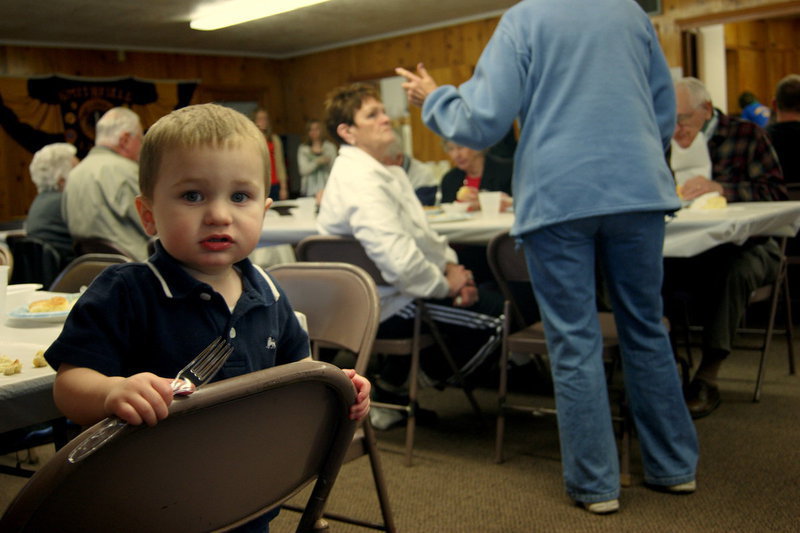Spaghetti helps the world see better
It’s not only the adults who enjoy the Lion’s Club annual spaghetti dinner. (Arianna Rees)
Just a spoonful of spaghetti sauce makes impaired vision rates go down in countries around the equator, or, at least, a six dollar spaghetti meal served by Lion’s Club members does.
Starting at 5 p.m. Thursday evening, volunteers and members of the Smithfield Lions Club sold dinner tickets and served spaghetti to local families and anyone stopping by until 7:30. Each meal consisted of spaghetti, a breadstick, salad, and a cookie or two, and the money from each meal sold will serve a special purpose.
An annual dinner that has gone on for four or five years, the Lion’s Club spaghetti supper usually costs $6 for those above the age of ten, $4 for those below, and nothing for those ages three and younger. It used to occur in January but was moved to March to provide safe travelling for the many families who enjoy it every year. It is an event that unites community members and, more importantly, changes the lives of people struggling with impaired vision.
Carroll Hansen, the Smithfield Lions Club president, said, “Our spaghetti dinner is always to raise money for the visually handicapped and we use all of our money raised from this spaghetti dinner to pay for different projects, really.”
Money from the event will go to the John A. Moran Eye Center in Salt Lake City, and Carroll said that half this year’s proceeds will go towards Logan Lions Club’s multi-Lion Pterygium Awareness and Prevention Project.
Carroll said, “[Pterygium] is a disease that effects people mostly around the equator because of the intense rays of the sun, and it causes a blindness to come upon their eyes as they grow older.”
She added that a cloud grows from the corners of their eyes out until it impairs their sight, and that can be cured simply by wearing a hat or wearing sunglasses.
“The project,” she said, “is essentially to educate the people to prevent the onset of this pterygium.”
Richard Criddle and his wife run eyeglass clinics for Hope Alliance, a non-profit organization. They set up the clinics and work mostly in Peru and Guatemala, and sometimes they hold clinics for those in the valley without money to get help with their eyesight.
For seven years, Criddle has gone to Peru with a group of volunteers to set up clinics around the equator and help to alleviate eyesight issues. They go with teams of 12 and stay in convents where they work closely with nuns. This year they will leave on June 10th and stay for several weeks to aid and educate locals.
“We take huge numbers of eyeglasses down,” he said. “We’ll have about 12,000 pairs. We get the people in, we measure their eyes and see what prescription they need, and then we use a computer search through our eyeglass database to find pairs with the right prescription. We put the two together, and they go out seeing.”
Altogether, he said, they have given out about 40,000 pairs of glasses.
“These people live right at the equator, and many of them at high elevation, so the sunlight comes down and it’s really intense, and they get a lot of UV light from the sun, and it causes a growth,” he said. “It gets bigger as it starts crossing the iris, causes a distortion in the shape in the eye, and therefore the vision goes off.”
350,000 people have this problem in Trujillo, Peru, the city the clinics will be set up in this year. At least 5,000 people are blind there, Criddle said. He said that one big goal is to make one million people aware of what they can do to prevent blindness and to spread that information around the equator.
With the money from events such as the Club’s spaghetti dinner, Lions Clubs in the valley can provide announcements, clinics, and educational messages for those around the world needing help.
Not only does the Club help peoples worldwide, but it also helps provide Smithfield families and school children with glasses that they desperately need but cannot afford, said Keith Hansen, Smithfield Lions Club secretary.
In the past, Carroll said, the dinner has been highly successful, and a lot of money has been raised for the visually handicapped through the tickets that are sold. The six dollars per meal literally pays for one pair of glasses, she said, and the more tickets that sell, the more the Club can help.
Richard Hansen, who stopped by and bought a meal, said, “I wear glasses. I know about eye sight, and I appreciate people who contribute their time to help others.”
Carroll said that the most rewarding part of holding the dinner is “the far reaching opportunity we have to do so much good.”
“You work hard one day,” she said, “but for the rest of the time, it does good for maybe someone’s entire life, and that’s a rewarding thing.”
Of Lions Club she said, “We’d love to have more people join Lions and come and be part of our projects and our programs. It’s a good way to do good things for people everywhere, especially those that are handicapped.”

